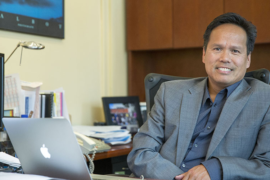As early as I can remember, I was taught to call my big brother “Kuya”, a Tagalog word showing respect for an older brother, older male cousin, or even male neighbor. My parents instilled this language of respect in me early and consistently, so much so that the first time they asked me to get my brother using his actual first name, I was confused and did not know who they were talking about (my worldview nearly exploded when I realized that his name was NOT literally “Kuya”).
 Fast forward many years, to my mother calling my then-21-year-old self to the kitchen. When I responded with a less-than-demure “WHAT?!”, I was quickly met with a very angry reminder that she is not my classmate, but my mother – and to be respected no matter how old I may have grown. Around the same time, I sent my father a text beginning with “Hey dad,” and was met with a response along the lines of “I am not your friend. Use proper grammar and show me some respect.”
Fast forward many years, to my mother calling my then-21-year-old self to the kitchen. When I responded with a less-than-demure “WHAT?!”, I was quickly met with a very angry reminder that she is not my classmate, but my mother – and to be respected no matter how old I may have grown. Around the same time, I sent my father a text beginning with “Hey dad,” and was met with a response along the lines of “I am not your friend. Use proper grammar and show me some respect.”
For many of us growing up in “traditional” Asian households, we were conditioned to know that respect for our elders is not optional. Now, going on 29, I recognize how much this discipline has shaped how I treat others and how I expect others to treat me. This is particularly evident in how I address pastors. I would never hesitate to correct a peer when they used only the first name of a pastor, and I would always ensure that the children and youth of my church would address the pastors as “Pastor.”
It was easier back when my only title was “miss.” Now serving in a pastoral role myself, I feel a greater tension. What about when no one calls me pastor?
“What about when no one calls me pastor?”
I currently serve in a Vietnamese immigrant church as the English ministry pastor. I was pleasantly surprised when the senior pastor wanted to call me “pastor” upon my hiring. She has been so supportive and empowering in my leadership, and wants the youth and young adults to respect me. Of course, we all know that respect goes beyond a title, but with this context in mind, it is easy to see why this tension has continued to grow. The youth have acknowledged me with the title of “Pastor,” but anyone older – from college students to adults – use my first name. I noticed that they did this with other English-speaking pastors as well – but with Vietnamese-speaking pastors, that “mục sư” would always come out.
This was a struggle for me to understand. I would think, “surely they understand that titles matter. Surely, they get that they are disrespecting me right now. Is it because I’m a woman… is it because I’m Filipina… or is it simply because they flat out do not respect me?” It was getting to me so much that I eventually recognized it was distracting me from actually ministering. My heart was demanding “respect” and getting in the way of me caring for the congregants. Continuing to pray for the Lord to humble me, I was reminded of this passage from Mark 10: 42-45 (ESV):
42 And Jesus called them to him and said to them, “You know that those who are considered rulers of the Gentiles lord it over them, and their great ones exercise authority over them. 43 But it shall not be so among you. But whoever would be great among you must be your servant,44 and whoever would be first among you must be slave of all. 45 For even the Son of Man came not to be served but to serve, and to give his life as a ransom for many.”
Humbled I was.
Now, I do not want the concept of humility to be misconstrued. I have heard stories from people serving in toxic church situations and that is not what I am speaking about – I do not believe that being silent while others abuse you or treat you as “lesser than” is acceptable. Neither am I excusing racist, sexist, belittling comments and situations. To “face persecution as a Christian” does not mean sitting and taking abuse and mistreatment. The Church must be held accountable for things that are not pleasing to God and that are harmful to others, such as harassment, prejudice, subversion.
When I speak on humility in the face of tension, I mean going against the grain in a culture that drills in respect and encourages you to continuously demand it. Whether an elder, deacon, pastor, teacher, or even simply the “older brother”, sister, auntie, uncle, grandma, or grandpa in the church, there must be a balance between instilling proper values and loving without expectation. The Lord continually reminds me that I cannot love only those that love me back with this “respect.” Beyond a title, even if they badmouth me, act rudely, or however else they may act, I must love them.
“I mean going against the grain in a culture that drills in respect and encourages you to continuously demand it.”
This love certainly entails teaching and correcting those we are entrusted with, but we must be cautious to ask: am I acting entitled, or acting graciously and loving freely? Even if we remove vocational ministry from the conversation, the call to be a servant is still there. This is the root of the Gospel and all Christian life. Though we have had our eyes graciously opened to the Lord and our need of salvation, it does not mean that we lift ourselves above non-Christians. Instead, we continue to exercise humility.
Who am I to “lord it over” these young members? Who am I, to serve in such a capacity and be entrusted with equipping others in the Word? Jesus is GOD and yet, He humbly came to this earth in the form of a human. He gave His life so that I may be able to have a real and intimate relationship with Him. He didn’t list out expectations and characteristics I had to meet first before He would save me. Who am I, to put parameters on those I choose to serve and love?
I am not advocating we throw good discipline and teaching out the window. I am saying that many of us who have grown up in, and are still living in, a “respect your elders” culture can lose sight of humility and instead allow shame or entitlement to get in the way of fulfilling what Christ calls us to. We must be a humble servant and remember that “even the Son of Man came not to be served but to serve, and to give his life as a ransom for many” (45).
Some scenarios call for immediate action. But for many environments, it will take time, patience, and Holy Spirit transformation continued over a long period of time to carry out accountability with tact and wisdom. Let us pray for wisdom in discerning when we must speak out against disrespect that has gone too far – and may we have wisdom to know when the Lord is calling us to humble ourselves.




Comments are closed.